2022
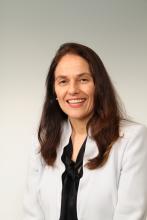
2022 UHC Day Message of Dr Sarah Barber, Director, WHO Centre for Health Development
Today, the world celebrates Universal Health Coverage (UHC) Day. This year, the theme is ‘Build the World We Want: A Healthy Future for All’.
This year’s theme is particularly important to all of us at the WHO Centre for Health Development- the WHO Kobe Centre (WKC). The world’s population is ageing. By 2050, the number of persons worldwide over 65 years will be more than twice the number of children under age 5.
We at WKC want to support the building of a world that provides a healthy future for older people. Population ageing presents challenges to ensuring UHC for all, including ensuring the availability of care appropriate to the needs of older people, financial accessibility to care, and financial sustainability and revenue generation for health and long-term care services.
WKC research has shown that many countries are ensuring universal access among older persons by evaluating innovative policies and programs to support health systems adapt to changing health needs. Research in Thailand demonstrated the importance of community care models that empower families in delivering health and social care for older persons. In the Philippines, evaluations of training programs demonstrated the value of interprofessional collaborations for health and social care workers in providing better quality care for older adults. And WKC supported the development of tools to help policymakers make better policy choices to ensure that health revenues and expenditures are managed as populations age.
Challenges remain, however. Our research has shown that the leading reason for unmet health care needs was affordability, followed closely by availability. We need better understanding of the unmet need for health and social care in countries around the world.
We also need to identify how to address equity in the access across diverse groups of older people.
This UHC Day, we call on policy-makers to be proactive in addressing the challenges of population ageing so that older persons can benefit from universal access to quality care.

Special journal supplement of Health Research Policy and Systems features research findings from ten countries supported by WHO Kobe Centre
The WHO Centre for Health Development (WHO Kobe Centre) is pleased to announce the publication of ten peer-reviewed papers in a journal supplement funded by WHO Kobe Centre, that present new findings that will inform health systems’ responses to rapid population ageing.
The population of older people continues to increase worldwide. The share of the global population aged 65 years or above is projected to rise from 10 per cent in 2022 to 16 per cent in 2050. As a result, by 2050, the number of persons aged 65 years or over will be more than twice the number of children under age 5. [1] This fundamental demographic shift will require significant shifts in focus of health and social policy guided by solid research evidence. This change will be manageable, even in lower- and middle-income countries in Asia and Africa, which will experience rapid population ageing at rates above 3 per cent per year, as they will still have relatively small proportions of older people in 2050, ranging from 5 to 13 per cent.
This special supplement of Health Research Policy and Systems features findings from ten countries: Cambodia, Japan, the Lao People’s Democratic Republic [Lao PDR], Malaysia, Mongolia, Myanmar, the Philippines, Singapore, Thailand, and Viet Nam. The studies reflect the challenges that this diverse set of countries face in progressively achieving universal health coverage (UHC) in the context of population ageing, including service fragmentation, limited availability and accessibility of care for older people, financial barriers to using care, and sustainability of financing and revenue generation for health and long-term care.
These research projects were selected for funding through a competitive process that targeted researchers and institutions in member states of the Association of South-East Asian Nations (ASEAN) countries and was part of a commitment by WHO Kobe Centre in the follow-up to the 2017 ASEAN–Japan Ministerial Meeting on UHC and Population Ageing.
These studies hold many insights crucial for future health policy:
- Prevalence and determinants of unmet needs for hypertension care among the older population in Selangor: cross-sectional study
- Unmet needs for hypertension diagnosis among older adults in Myanmar: secondary analysis of a multistage sampling study
- Assessment of cognitive function among adults aged ≥60 years using the Revised Hasegawa Dementia Scale: cross-sectional study, Lao People\'s Democratic Republic (Lao PDR)
- Developing a toolkit for implementing evidence-based guidelines to manage hypertension and diabetes in Cambodia: a descriptive case study
- In-service training programme for health and social care workers in the Philippines to strengthen interprofessional collaboration in caring for older adults: a mixed methods study
- Effectiveness of community integrated intermediary care (CIIC) service model to enhance family-based long-term care for Thai older adults in Chiang Mai, Thailand: a cluster randomized controlled trial TCTR20190412004
- Household financial burden associated with health care for older people in Viet Nam: A cross-sectional survey
- Ethics of Participation and Social Inclusion of Older Persons in Research: Lessons learnt from the Covid-19 Pandemic in Singapore
- Implication of using cognitive function-related simple questions to stratify the risk of long-term care need: population-based prospective study in Kobe, Japan
- Can healthy ageing moderate the effects of population ageing on economic growth and health spending trends in Mongolia? A modelling study
Read the editorial by WHO Kobe Centre’s Megumi Rosenberg, Shinichi Tomioka and Sarah Louise Barber.
Find all ten papers in the supplement published by BioMed Central’s Health Research Policy and Systems.
----------
[1] United Nations Department of Economic and Social Affairs, Population Division (2022). World Population Prospects 2022: Summary of Results. UN DESA/POP/2022/TR/NO. 3.
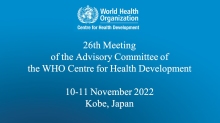
Closing of the 26th Annual Meeting of the Advisory Committee of the WHO Centre for Health Development
The WHO Centre for Health Development (WHO Kobe Centre – WKC) was established in 1995 with support from the Kobe Group and endorsement of WHO’s Executive Board.
WKC’s research plan for 2018-26 aims to study health systems in the context of population ageing and health emergencies and disaster risk management (HEDRM) to accelerate progress towards Universal Health Coverage (UHC).
The Advisory Committee for WKC (ACWKC) is appointed by the WHO Director-General (DG) to represent WHO’s six regions, the host country, local community, and donor group.
The 26th annual meeting on 10-11 November 2022 advised the Director-General and the Director of WKC about strategic priorities.
The meeting discussed the Centre’s progress in 2020-21 in research and local engagement and follow-up to the 2021 ACWKC recommendations. The Chair, Dr Viroj Tangcharoensathien, and Rapporteur, Dr Irene Agyepong, presided over the meeting and presented its recommendations.
The ACWKC congratulated WKC on implementing last year’s recommendations and the Centre’s impressive performance on research, publications, and local engagement. Eleven specific recommendations were made, including efforts to strategically focus on the next ten year strategic priorities for 2026-36.
The full report will be released shortly.
Lecture for the Masters students of the Queen Mary University of London
On 26 October, the Director of the WHO Centre for Health Development, Dr Sarah L. Barber, gave a guest lecture to Masters students studying Global Public Health at the Queen Mary University of London. She spoke about what Universal Health Care (UHC) is, why it’s so important as a human right and as an economic pillar for countries and families, and the work the WHO Kobe Center is doing to conduct research globally that advances UHC. In the lecture, she shared her research on the policy choices decision-makers face on how to deliver and fund services in a sustainable way, particularly under rapid population ageing. The students were engaged and were particularly interested in the new tool Dr Barber is developing with her colleagues, the Population Ageing Financial Sustainability (PASH) Simulator.
Many thanks to Dr Sinead Jones for the invitation.

Population Ageing Financial Sustainability gap for Health systems (PASH) Simulator
With population ageing occurring globally, there is a fear that growing numbers of older people will place unsustainable challenges on health systems. This fear stems from a well-studied assumption that there will be increasing demands for services as people age. However, what hasn’t been as well studied is the gap in health revenue generation. How can we better consider effects on both health revenues and expenditures as the population age mix changes so as to better the sustainability of health financing models?
In a new paper published in Health Policy, WHO Kobe Centre Director Dr Sarah Louise Barber joins leading experts to propose a new tool – The Population Ageing Financial Sustainability gap for Health systems (PASH) Simulator. The PASH Simulator allows policymakers to study this more systematically by simultaneously forecasting how changes in the population age-mix affect both health revenues and expenditures and showing the gap between them over time.
The paper demonstrates the Simulator, using a set of six country scenarios based on data from countries in Europe and the Western Pacific representing a diverse range of health financing systems. The authors conclude that equal attention must be paid to both health revenues and expenditures to steer decision makers towards a more balanced set of policy options to address the challenges of population ageing. By showing the gap and the structural elements that influence it, the new method provides policymakers with a broader set of policy options to consider in an effort to address financing shortfalls.
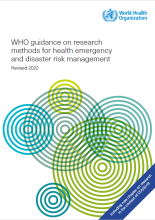
WHO Guidance on Research Methods for Health Emergency and Disaster Risk Management - updated with a new chapter on how to conduct research in the context of COVID-19
In 2021, the WHO Kobe Centre (WKC) published comprehensive guidance on how to plan, conduct, and report research on health emergency and disaster risk management (Health EDRM - the WHO Guidance on Research Methods for Health Emergency and Disaster Risk Management. This document was developed in collaboration with 164 from 30 countries, WHO Headquarters and all regional offices. It is a living reference to be updated regularly. In response to the increased demand for research due to the COVID-19 pandemic, WKC in close cooperation with global partners revised the Guidance. Today, we are excited to launch the updated guidance with a new chapter on how to conduct research in the context of COVID-19. -One of the book editors, Dr Ryoma Kayano of WKC, joined WHO experts and global experts to author the updated chapter, which highlights the impact of COVID-19 on Health EDRM policy and programmes, and enumerates key challenges and lessons for Health EDRM research in the context of the pandemic, aiming to help Member States and all stakeholders plan and conduct research projects under future possible epidemics and pandemics.
“This pandemic has highlighted many uncertainties about how best to manage the risks of a pandemic and its consequences. As research and other evaluations of COVID-19 continue to identify and describe the lessons from COVID-19, it will be essential that policymakers, practitioners, researchers and all stakeholders apply and translate those lessons into stronger capacities for managing the risks of future pandemics and other types of emergencies.”
The new revised version is available from the WHO publication webpage
Read more here and watch videos on the background and introduction to the Guidance.
The new systematic review on long term mental health trajectories after disasters and pandemics
Mental health challenges are of significant concern for everyone after a disaster. This World Mental Health Day, it is crucial to remember that these challenges aren’t just in the immediate aftermath, but often become a chronic condition, especially for children and adolescents.
A new study funded by the WHO Kobe Centre (WKC) proves the devastating impact of emergencies and disasters on mental health many years after the disaster has happened. Pulling together the results of over 200 studies done in English, Chinese, and Japanese, a multinational team led by Dr Elizabeth A. Newnham of Curtin University has shown that depression and anxiety rates remain elevated for years following a disaster, with significantly higher rates for children and adolescents.
“On average, 24% of people affected by disasters will develop clinically significant post-traumatic stress syndrome (PTSS) in the first six months following exposure, 28% will develop depressive symptoms, and 23% will develop anxiety.”
The first multilingual systematic review of its kind, it finds that mental health rates showed a gradual improvement over time, but trajectories varied by disorder. Prevalence of PTSS significantly improved in the years following exposure, and the trajectory of recovery did not differ by age.
However, prevalence of depression and anxiety symptoms remained elevated for years following disasters, and children and adolescents reported significantly higher rates compared to adults both right after the disaster as well as years afterwards.
“These findings augment calls for sustainable systems of mental healthcare to be established in disaster-affected settings, with specific attention to child and adolescent psychological needs”
The study signals that tailored interventions are needed to address high levels of PTSS, depression and anxiety in the earlier stages of recovery, with continued attention to depression and anxiety among trauma-affected populations in the years following disaster.
The study signals that tailored interventions are needed to address high levels of PTSS, depression and anxiety in the earlier stages of recovery, with continued attention to depression and anxiety among trauma-affected populations in the years following disaster
Find the study here.
Hear from the lead researcher, Dr Elizabeth A. Newnham of Curtin University
Elizabeth A. Newnham, Enrique L.P. Mergelsberg, Yanyu Chen, Yoshiharu Kim, Lisa Gibbs, Peta L. Dzidic, Makiko Ishida DaSilva, Emily Y.Y. Chan, Kanji Shimomura, Zui Narita, Zhe Huang, Jennifer Leaning, Long term mental health trajectories after disasters and pandemics: A multilingual systematic review of prevalence, risk and protective factors, Clinical Psychology Review, Volume 97, 2022.
-
School of Population Health, Curtin University
-
Curtin enAble Institute
-
Asia Pacific Disaster Mental Health Network
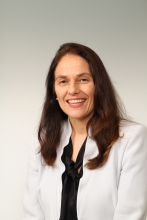
Respect for Aged Day - Director's message
Today, 19 September 2022, Japan celebrates “Respect for the Aged Day”. The Day honors and appreciates the contributions senior citizens have made to society. The WHO Centre for Health Development in Kobe (WHO Kobe Centre or WKC) is proud to be associated with this national day through Hyogo Prefecture, the origin of this honourable tradition and one of our key benefactors along with Kobe City.
Japan is world famous for its very high population of centenarians – people who are over one hundred years old. We honor them and all older people who contribute so much to our community.
Most countries in the world now face a similar challenge as Japan – a emergent older population that require integrated health and social systems that are prepared to respond to their changing needs. Integrated long-term care is essential for older persons’ wellbeing; yet, formal long-term care systems are far less developed in most countries compared to health care systems.
At WKC, we work with partners across the globe and in the Kansai region of Japan to identify factors that affect equitable access to health and social care services for older people. We draw on lessons from the Kansai region of Japan and the Asia Pacific Region more widely to inform global policy development and help national authorities to take appropriate action to address the inequities that older people face in accessing needed care. For example, as the world moves to accelerate access to Universal Health Care (UHC), WKC is advocating for monitoring frameworks and metrics that measure how well health systems are adapting to the complex health needs of older persons. For more information about our mission, read further here.

Dr Sarah Barber gave a Lecture for Juntendo University on 17th June
As a part of the Global Gerontology Course at Juntendo University organized by Dr Myo Nyein Aung, Dr Sarah L Barber gave a lecture to students about the economic implications of population ageing and long-term care on 17 June 2022. She emphasized that investments in promoting healthy ageing can have important benefits to individuals and economic returns to the community and society. The students actively engaged in discussing the challenges of convincing governments particularly in low- and middle-income settings to invest in healthy ageing and long-term care systems.
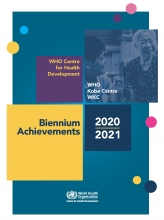
WKC’s first Biennium Achievements Report: 2020-2021
The WHO Centre for Health Development (WHO Kobe Centre – WKC) has produced an Achievements Report for the WHO biennium of January 2020 to December 2021.
The report coincides with the first two years of the COVID-19 pandemic as well as two external reviews of the Centre. It reflects WKC’s new mission and vision, and the consequent realignment of its research agenda focusing on two broad themes of universal health coverage (incorporating service delivery, sustainable financing, innovation and metrics), and health emergencies and disaster risk management.
Our work would not be possible without the support of the Kobe Group and the Hyogo and Kobe communities, and the guidance and assistance we receive from the WKC Advisory Group and the WKC Scientific Working Group.
WKC is a global research centre of excellence focusing on health systems responses to accelerate Universal Health Coverage in the context of population ageing, and health emergencies and disaster risk management.
Click here to read the report.

